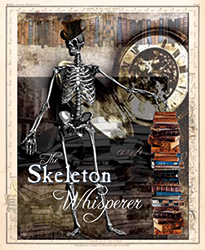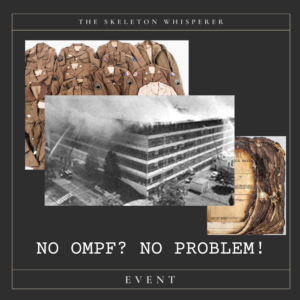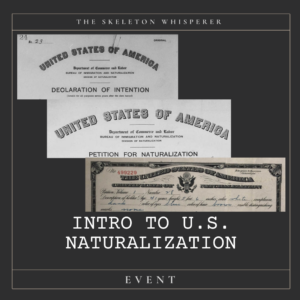Speaking
YES! I am Webinar Ready and all of these presentations are available to your society as a Virtual Meeting!
If your group is NEW to having Virtual Meetings, that's ok! We can schedule an extra 30 minutes at the beginning of the presentation to allow for troubleshooting and making sure everyone is ready to start. If you're not new to virtual meetings, but missing that social time, we can schedule that same 30 minutes so you can visit before we start!
Below are the lectures currently available to be presented to your Society's Membership. Contact me today to discuss booking one of these topics, or tailoring a new presentation for your group.
Presentation Topics:
From a Box in the Closet to a Treasured Family Heirloom
If you're overwhelmed by the collection of photos your family has accumulated, you're not alone! After a brief history of photography, we look at organizing techniques, digitization basics, and options/ideas on what to do with your photos so they can be enjoyed by generations to come, instead of collecting dust in the box.
Disaster Proofing Your Research
Family historians spend years, sometimes decades gathering and compiling records, photographs, and family heirlooms to preserve the past and guide the future. Let's talk about ways to ensure that all this hard work isn't lost in any number of potential disasters.
Grandma Said What? Gathering and Verifying Your Family’s Oral History
We will define what oral history is and talk about strategies to interview your family; then, go through the process of verifying a family story.
Locating Records in Archives from Your Couch
The digital age has brought billions of records to genealogists' living rooms. However, there is much more only available in hard copy. Learn how to track down these valuable resources, wherever they are in the world, without leaving the comfort of your own home.
Who Needed it Anyway? Getting Around the Missing 1890 Census
The loss of the 1890 Federal census is a source of great frustration for American Genealogists, but all hope is not lost! Learn strategies and gather tips for success in locating your family in other records between the 1880 and 1900 Federal censuses.
Why We Still Don't Miss 1890. Much.
This follow-up presentation to "Who Needed it Anyway?" will explore even more resources to help us find our families between 1880-1900 and complete the case study.
Extra! Extra! Find Your Family in the Newspaper!
If you only think about obituaries when you think of newspapers for genealogy, you may be missing out! We take a look at the types of information we can find about our family in the paper and then learn where to find it - online and offline.
Hopping Down the Paper Trail
The records our ancestors left behind often lead us to other records, and sometimes take us down a rabbit hole. Learn how to scour those records for the next clue, and how to prioritize those clues so that you stay on track.
Missing: Reward! Locating Widows, Spinsters, and Bachelors
Have some of the folks on your family tree disappeared? Pick up some new ideas on how to find widows and never-married adults and then watch these techniques in action in three short case studies.
Two Steps Forward, One Step Back: Is this Genealogy or the Cha-Cha?
Revisiting and reevaluating our early research and home sources of information might seem like a waste of time, but often, it’s the key to getting past a roadblock in our research. We’ll discuss techniques for finding new clues in records we already have and look at several small case studies to see the value of taking the time to go backward in order to go forward.
Shamrocks, Leprechauns, and Harps: Researching your Irish Roots
Ireland can be a challenging place to research! Learn about what records do exist, and what no longer exists, before you get started searching for your Irish roots.
Irish Eyes Are Smiling: Finding Vital Records in the land of Saints and Scholars
Get to know the Irish Civil Registration records! These Birth, Marriage, and Death records began country-wide in 1864 and contain a wealth of information about our ancestors. Learn how to access these records right from your own home through multiple websites.
Suddenly Scotland! An Introduction to Scottish Research
In this general overview of Scottish research, learn about the history of Scotland and what resources are available for finding the story of your family.
To Spit or Not to Spit? Is DNA testing right for your research?
Covering the very basics of Genetic Genealogy, we will review the types of DNA tests available; list the companies that offer them, and determine how to choose which is best for your research and which family members to test – if any!
My DNA Brought me to the Forest, but Where are all the Trees?
Genealogical DNA tests are bringing thousands of new cousins to our attention, but many of them don't have trees yet, or the trees aren't attached to their test. Learn some new techniques for figuring out where how these individuals connect with you. (Focus is on Ancestry.com results system).
Genealogy 101: Tree Climbing for the Beginner
This class discusses the very first steps to take after you've decided to start researching your family, including general tips for success, understanding different record types, and research planning.
What's in a Name?
How much does spelling matter when we’re dealing with historical records? Why are there so many variations, anyway? Have you ever wondered if that record for Abraham Miller is really for your Abram Meuller, or why you can’t find an ancestor in the Springfield marriage records? This presentation takes a deeper look at how relying too much on spelling has the potential to trip up our research.
Networking for Genealogists
Genealogy Societies, Conferences, and institutes are a great way to meet new genealogy friends, colleagues, and occasionally, a cousin. Visiting time at these events is often limited, so how do you get the most out of those few minutes of meet and greet? Let’s take some tips from the business world and apply them to family history.
Shaky Leaf Syndrome: Using Website Generated Hints More Effectively
Indexing, optical character recognition, and computer algorithms make finding obscure records about our families easier than ever! Unfortunately, computers can’t distinguish between people of the same name who lived in different places or at different times. Using real examples, we’ll practice evaluating hints and attaching the keepers to our trees.
National Archives at Riverside: A Virtual Tour
Tucked into an unassuming building off a major freeway in Riverside County are the Federal agency records from Arizona, Clark County Nevada, and Southern California. In this virtual tour, we’ll visit the NARA website, plan a trip to the archive, and meet just a few of the genealogically rich record sets held here.
Where There's a Will...
Wills and Probate records can be genealogical goldmines. We start with an overview of these records, the probate process, and tips for finding and using these records. This interactive class will show ways to turn a will into a starter family tree. *Can be customized for your society’s location.
There's a Lineage Society for that!
Was your ancestor a tavern keeper, postal worker, or teacher? There are lineage societies for that! What’s a lineage society, and why should you consider them? This class reviews the benefits of joining these societies, provides tips for leveraging their resources, resources for finding societies you’re eligible for, and tips for preparing your application.
Introduction to U.S. Naturalization
Millions came, stayed, and naturalized. The benefits of becoming a U.S. citizen were significant and included the right to vote and claim land under the homestead act. In this overview of the naturalization process we’ll look at key laws and requirements for citizenship, from 1776 to the mid-1900s, and the records generated by the process.
A Deed in the Hand is Worth Two in the Books
Land records can be genealogical goldmines, even if your ancestor wasn’t the deed holder. We start with an overview of how land transferred from the government to private hands and between individuals. Then consider the power of land records to answer genealogical questions, and look at tips for finding and using these records. Includes a live look at Full-Text Search.
Preparing for 3rd Party DNA Tools
You may discover a need to use third-party DNA tools to better understand your results and further your genealogy research. We will discuss how to get the most out of the site you tested with, various third-party tools, and how to select the right tool for the job. Included: how to download your raw DNA results and the benefits of adding GEDcoms to those sites.
No OMPF? No Problem!
Researching 20th Century veterans is especially difficult as a fire destroyed millions of Official Military Personnel Files in 1973. This class will look at other ways to find the stories of the WWI and WII veterans in our families.
Citations. Why Did it Have to Be Citations?
Citations are a necessary part of genealogical research. With the right approach, they don't have to be the scary part!
Meet Your New Research Assistant: AI for Genealogists
Discover how AI can act as your personal research assistant. This class will introduce you to AI tools like ChatGPT and FamilySearch's full text search, offering practical tips and techniques to save time, find hidden records, and enhance the accuracy of your family history research.
Coming Soon:
Good Better Best Onsite Research (May 2025)
Thorough genealogical research requires visiting libraries, archives, and other repositories. Discover how to make the most of your genealogy research trips! Learn to plan effectively, prioritize records, and organize findings before, during, and after your visit—ensuring you maximize discoveries and minimize unfinished work.
What the Law Put Asunder: Divorce in America (September 2025)
*Description coming soon*
Where Does This Go? Organizing Your Genealogy Gems (January 2026)
Whether you’re just starting to climb the family tree or you’re an experienced researcher, come learn practical tips to organize your genealogy treasures and create an easy-to-maintain system that lasts!
Available Workshops:
Hopping Down the Paper Trail
The records our ancestors left behind often lead us to other records, and sometimes take us down a rabbit hole. Learn how to scour those records for the next clue, and how to prioritize those clues so that you stay on track.
Disaster Proofing Your Research
Family historians spend years, sometimes decades gathering and compiling records, photographs, and family heirlooms to preserve the past and guide the future. Let's talk about ways to ensure that all this hard work isn't lost in any number of potential disasters. Workshop includes hands-on practice
To Spit or Not to Spit? Is DNA testing right for your research?
Covering the very basics of Genetic Genealogy, we will review the types of DNA tests available; list the companies that offer them, and determine how to choose which is best for your research and which family members to test – if any!
Two Steps Forward, One Step Back. Is this Genealogy or the Cha-Cha?
Revisiting and reevaluating our early research and home sources of information might seem like a waste of time, but often, it’s the key to getting past a roadblock in our research. We’ll discuss techniques for finding new clues in records we already have and look at several small case studies to see the value of taking the time to go backward in order to go forward.
Genealogy 101: Tree Climbing for the Beginner
Designed as an interactive workshop, this class discusses the very first steps to take after you've decided to start researching your family.
Networking for Genealogists
Genealogy Societies, Conferences, and institutes are a great way to meet new genealogy friends, colleagues, and occasionally, a cousin. Visiting time at these events is often limited, so how do you get the most out of those few minutes of meet and great? Let’s take some tips from the business world and apply them to family history.
Let's Meet DNA Painter!
DNA testing has brought thousands of genetic family members to our attention. Now, we seek to visualize how they are related to us in a more concrete way. In this class, we will explore all of the tools at DNA Painter and how they can help us understand our genetic family history in a whole new way. Runs about 90 minutes with multiple Q&A opportunities.


